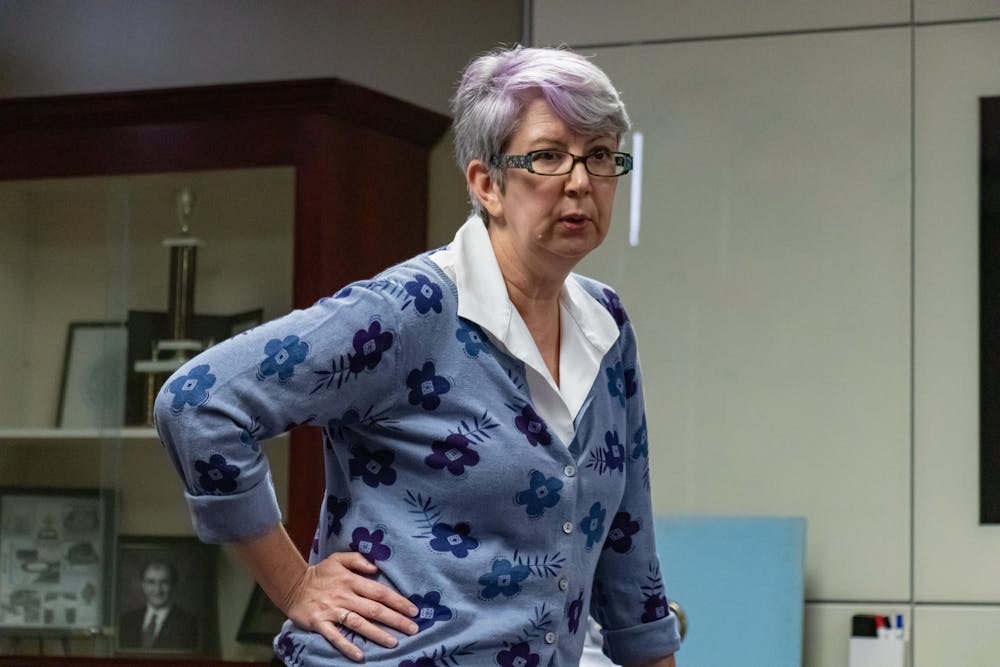USC faculty members are trying to amend the Chicago Principles to a new version for USC that would help guard campus from a potential critical race theory ban by the Statehouse.
Some members of faculty senate's ad-hoc committee on academic freedom, which was originally formed amid Statehouse bills aiming to ban the instruction of critical race theory are looking to expand the rules in USC's faculty manual, defending all people on campus' right to free speech and expression in an educational setting.
USC's faculty manual currently abides by the American Association of University Professor's 1940 Statement of Principles of Academic Freedom, which states that "the university shall defend academic freedom against any encroachment."
The committee began drafting proposals for a new section on academic freedom after other senators proposed that USC should adhere to the Chicago Principles, which aim to protect free expression on college campuses.
More than 90 American universities adhere to the Chicago Principles, including Clemson and the University of Alabama.
However, some members of the committee found that the Chicago Principles leave gaps in addressing everything on campus, leaving out things like academic freedom in libraries or for student athletes.
Erik Doxtader, a delegate from the English department, called the town hall together on March 27, saying there were several "basic questions" needing to be addressed by the ad-hoc committee's proposal. He said defining freedom of speech is one.
"The first question is, 'What is the difference between freedom of speech and freedom of expression?'" Erik Doxtader, a faculty senator from the English department said during faculty senate on March 1. "Those are not the same things."

On top of the manual’s lack of academic freedom policy for libraries and student athletes, faculty senators are also trying to make the Chicago Principles more applicable to USC.
Ad-hoc committee chair Carol Harrison said the university needs more protection from attacks by a potential CRT ban and that the faculty manual should allow the university as a whole and professors to speak out against speech that violates the Carolinian Creed.
The Carolinian Creed is a statement of USC’s values, which addresses academic integrity and pledges to "discourage bigotry, while striving to learn from differences in people, ideas and opinions."
Universities are not just venues for learning — they also make official press statements, which faculty senators are concerned will speak for too much of the university. Because of this, senators like Harrison suggest using the Carolina Creed as a guideline or a standard.
"The idea that the university leadership will remain neutral in all circumstances and never speak at all has the effect of the leadership supporting those who are in power," Harrison said. "I think it is entirely possible for the university to say, 'We disapprove of the content of the speech ... We think that it violates the principles of the Carolinian Creed.'"
The aim of this proposal and ad-hoc committee is to protect free speech on campus and examine the Chicago Principles and if USC needs its own statement on academic freedom, according to Harrison.
Academic freedom in universities is not just to protect professors from talking about anything, according to Susan Bon, a professor and the interim associate dean for research and faculty affairs in the College of Education.
In 2015, a Louisiana State university professor was fired for using profanity and discussing sex during class which would go on to spark the 2019 Buchanan v. Alexander appeals case.
With the potential ban on CRT, several professors are debating academic free expression not just for the sake of their jobs but to also help teach students.
"Think back about when did you have that greatest ‘aha’ learning moment in one of your courses when you were in college or high school or whenever," Bon said. "It probably wasn't when your instructor went on an off-ramp discussion of their sex life or off-ramp or inappropriate discussion of somebody else's sex life or some other personal opinion, wholly unrelated to the course."
The proposed amendment to the faculty manual’s section will be voted on during the next faculty senate April 5.

